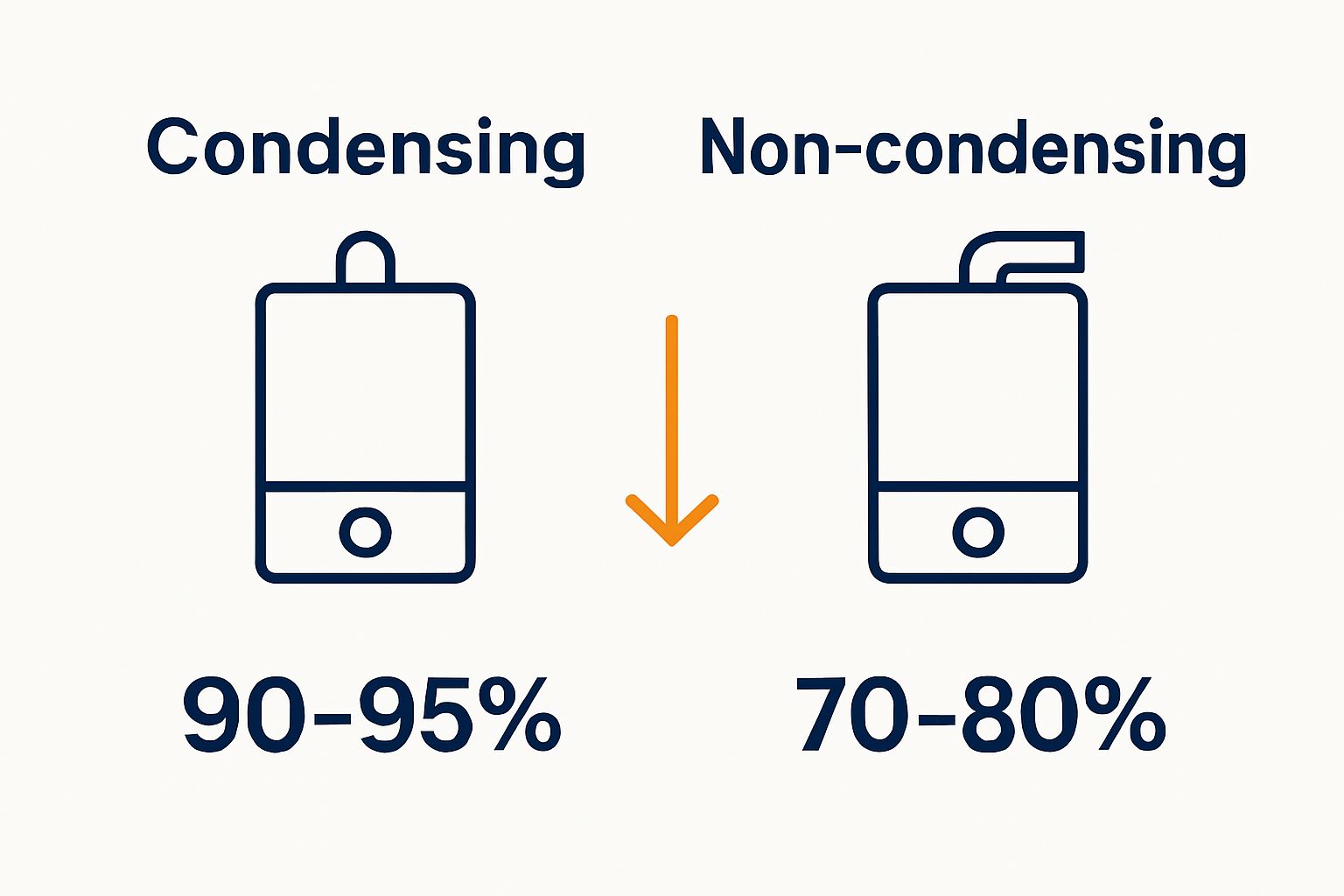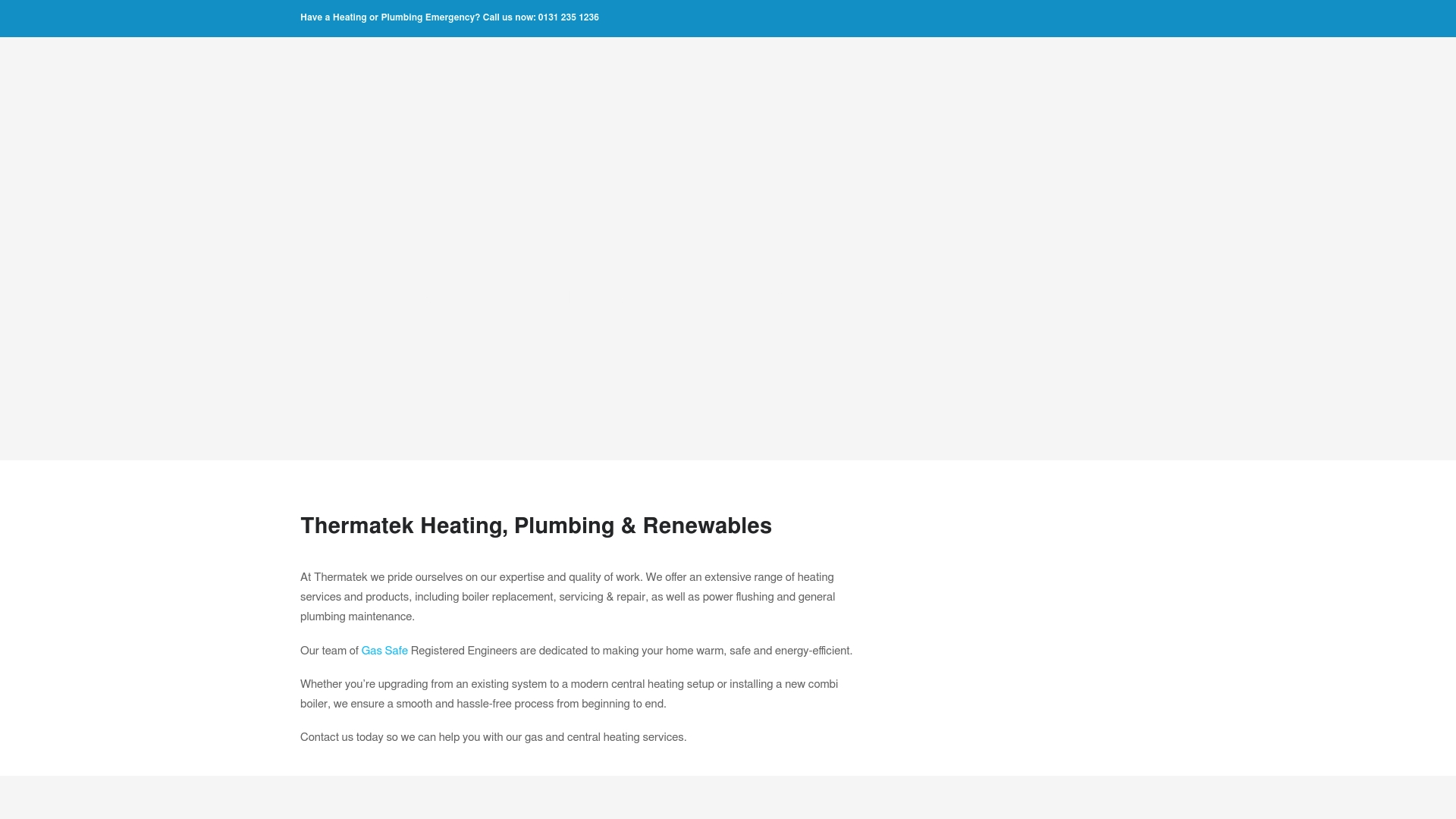Understanding Boiler Efficiency Ratings for Homeowners
Boiler efficiency ratings are on every homeowner’s mind when tackling energy bills and winter chills. Yet most people have no idea that an A-rated condensing boiler can convert up to 95 percent of fuel into heat, leaving only a tiny amount wasted. This sounds impressive, but the bigger shock is how these ratings can impact both your wallet and your carbon footprint in ways most never consider.
Table of Contents
- What Are Boiler Efficiency Ratings?
- Why Do Boiler Efficiency Ratings Matter?
- How Boiler Efficiency Ratings Are Calculated
- Key Concepts Related to Boiler Efficiency Ratings
Quick Summary
| Takeaway | Explanation |
|---|---|
| Higher efficiency saves money | High-efficiency boilers reduce fuel consumption and lower monthly energy bills, providing significant financial benefits over time. |
| Understanding grading helps decision-making | Familiarity with efficiency ratings and grading systems enables homeowners to evaluate their options and choose the most economical heating systems. |
| Environmental impact is significant | Efficient boilers decrease fuel usage and carbon emissions, contributing positively to environmental sustainability and climate responsibility. |
| Condensing technology maximizes efficiency | Condensing boilers capture waste heat and improve overall efficiency, achieving ratings above 90%, making them the best option for energy savings. |
| Seasonal factors influence performance | Recognising that boiler efficiency can fluctuate with outdoor temperatures helps in planning heating requirements for maximum efficiency throughout the year. |
What Are Boiler Efficiency Ratings?
Boiler efficiency ratings represent a critical metric that measures how effectively a heating system converts fuel energy into usable heat for your home. These ratings provide homeowners with a clear understanding of their boiler’s performance, energy consumption, and potential cost savings.
The Science Behind Efficiency Ratings
At its core, a boiler efficiency rating quantifies the percentage of fuel energy successfully transformed into heat. Modern boilers in the United Kingdom are evaluated under the Energy-related Products (ErP) directive, which standardizes measurement and helps consumers make informed decisions.
For instance, a boiler with an 90% efficiency rating means that 90 pence of every pound spent on fuel is directly converted into heat, while 10 pence is lost through various thermal transfer processes. This metric becomes crucial when considering long-term energy expenses and environmental impact.
Understanding Efficiency Grading Systems
Boiler efficiency is typically represented through two primary grading methods:
- Percentage Efficiency: A direct measurement showing the proportion of fuel energy converted to heat
- Letter Grades (A-G): A simplified visual representation where A represents the most efficient boilers
A modern high-efficiency condensing boiler might achieve an A-rating, indicating it operates at 90% efficiency or higher. These advanced systems capture and reuse heat that traditional boilers would typically lose, making them significantly more economical.
For homeowners in Edinburgh and Midlothian seeking comprehensive insights, read more about how boiler systems work to appreciate the intricate mechanics behind these efficiency ratings.
Why Do Boiler Efficiency Ratings Matter?
Boiler efficiency ratings are far more than abstract technical measurements. They represent a direct connection between your home’s heating system, financial expenditure, and environmental responsibility. Understanding these ratings empowers homeowners to make informed decisions about their energy consumption and long-term household expenses.
Financial Implications of Efficiency
The most immediate impact of boiler efficiency ratings is on your household budget. According to the Energy Saving Trust, inefficient boilers can significantly increase annual energy costs. A low-efficiency boiler might waste substantial energy and money, whereas a high-efficiency system can generate remarkable savings.
Consider these potential financial benefits:
- Reduced monthly energy bills
- Lower fuel consumption
- Decreased long-term maintenance expenses
- Potential government incentives for energy-efficient installations
Environmental Considerations
Beyond personal finances, boiler efficiency ratings play a crucial role in reducing carbon emissions. Higher-efficiency boilers consume less fuel to generate the same amount of heat, directly contributing to reduced greenhouse gas production. This makes efficiency ratings a critical factor for environmentally conscious homeowners.
Long-Term Home Performance
Modern boiler systems with high-efficiency ratings offer more than immediate financial savings. Learn more about condensing boiler technology which represents the pinnacle of heating system efficiency. These advanced systems not only reduce energy consumption but also provide more consistent and reliable heating, enhancing overall home comfort and performance.
How Boiler Efficiency Ratings Are Calculated
Calculating boiler efficiency ratings involves complex thermal engineering principles that measure how effectively a heating system transforms fuel energy into usable heat. This scientific process provides homeowners with a standardised method to understand their boiler’s performance and energy conversion capabilities.
Technical Measurement Principles
According to the Building Research Establishment (BRE), boiler efficiency ratings are determined through precise thermal performance testing. Engineers measure the ratio between heat output and total energy input, considering multiple critical factors:
- Amount of fuel consumed
- Total heat generated
- Heat loss during energy transfer
- Combustion chamber performance
For example, if a boiler consumes 100 kilowatts of energy and produces 90 kilowatts of usable heat, its efficiency rating would be 90%. Modern testing protocols ensure these measurements reflect real-world performance conditions.
Standardised Evaluation Methods
The United Kingdom follows the Energy-related Products (ErP) directive, which establishes standardised calculation methodologies. These methods account for seasonal variations, ensuring efficiency ratings represent comprehensive performance across different operating conditions.
Key evaluation parameters include:
- Seasonal space heating efficiency
- Water heating efficiency
- Part-load and full-load performance metrics
Practical Implications of Calculation Methods
Understanding how these ratings are calculated helps homeowners make informed decisions. Learn more about heating system regulations that govern these technical assessments. By comprehending the scientific principles behind efficiency measurements, you can better appreciate the technological sophistication of modern heating systems and their potential energy-saving capabilities.
Key Concepts Related to Boiler Efficiency Ratings
Boiler efficiency ratings encompass a range of technical and practical concepts that go beyond simple numerical measurements. Understanding these key principles helps homeowners make informed decisions about their heating systems and energy consumption strategies.
Types of Boiler Efficiency Technologies
According to the Energy Saving Trust, different boiler technologies significantly impact overall efficiency. The two primary categories homeowners should understand are:
- Condensing Boilers: Advanced systems that capture and reuse heat from exhaust gases
- Non-Condensing Boilers: Traditional systems that release heat through exhaust, resulting in lower efficiency
Condensing boilers represent the pinnacle of heating technology, typically achieving efficiency ratings between 90-95%. By capturing latent heat that would otherwise be wasted, these systems transform potential energy losses into additional heating capacity.
The table below compares key features and characteristics of condensing and non-condensing boilers as outlined in the article, helping homeowners identify differences at a glance.
| Boiler Type | Heat Recovery Mechanism | Typical Efficiency (%) | Carbon Emissions | Notes |
|---|---|---|---|---|
| Condensing Boiler | Captures and reuses exhaust heat | 90-95 | Lower | More efficient, modern technology |
| Non-Condensing Boiler | Releases exhaust heat without reuse | Below 85 | Higher | Traditional, less efficient systems |

Seasonal Performance Factors
Boiler efficiency is not a static measurement but a dynamic concept influenced by multiple environmental and operational factors. Seasonal performance factors consider how boilers operate under varying temperature conditions, recognising that efficiency can fluctuate throughout the year.
Key seasonal performance considerations include:
This table summarises the main factors that influence a boiler’s seasonal performance as discussed in the article, allowing homeowners to see the dynamic elements affecting efficiency throughout the year.
| Factor | Influence on Boiler Efficiency |
|---|---|
| Outdoor temperature variation | Efficiency can fluctuate based on external temperature |
| Heating system load requirements | Higher or lower demand impacts operational efficiency |
| Property insulation quality | Better insulation helps retain heat and improve efficiency |
| Heating cycle frequency/duration | Frequent cycles or longer use may affect real-world performance |
- Variation in outdoor temperatures
- Heating system load requirements
- Insulation quality of the property
- Frequency and duration of heating cycles
Practical Efficiency Evaluation
Beyond technical specifications, efficiency ratings translate into tangible home heating experiences. Explore our comprehensive guide to home heating systems to understand how these efficiency concepts directly impact your household’s comfort and energy consumption. By comprehending these nuanced factors, homeowners can make more strategic decisions about their heating infrastructure.

Turn Boiler Efficiency Knowledge Into Real Savings for Your Home
You have just discovered how critical boiler efficiency ratings are when it comes to reducing your energy bills and keeping your home warm and comfortable. Understanding concepts such as condensing technology and percentage efficiency is only the first step. The real challenge is translating this knowledge into action, so you stop losing money to old, inefficient systems and start enjoying reliable warmth and lower costs.

Now is the perfect moment to act. At Thermatek Heating, our Gas Safe Registered engineers use advanced efficiency assessments and the latest installation skills to help Edinburgh and Midlothian homeowners experience the full benefits of modern heating. Unsure which boiler suits your needs, or want a free, expert quote? Contact us today to get personal advice on replacements, servicing or efficiency upgrades. Upgrade your heating system soon and see immediate improvements in comfort, reliability and energy savings. Do not let hidden energy waste linger—make your home work efficiently for you.
Frequently Asked Questions
What does a boiler efficiency rating indicate?
A boiler efficiency rating indicates how effectively a heating system converts fuel into usable heat for your home. A higher rating means more fuel is used to produce heat, which can lead to lower energy bills. Check the efficiency rating when choosing or upgrading your boiler to ensure cost-effective heating.
How can I improve my boiler’s efficiency?
To improve your boiler’s efficiency, consider regular maintenance, such as an annual service. Cleaning components and checking for leaks can enhance performance, potentially increasing efficiency by around 5-10%.
What is the difference between condensing and non-condensing boilers?
Condensing boilers capture and reuse heat from exhaust gases, achieving higher efficiency ratings of 90-95%. In contrast, non-condensing boilers release heat through the exhaust, resulting in lower efficiency. Evaluate these options when selecting a boiler type to optimise your heating system.
How can boiler efficiency ratings affect my energy bills?
Boiler efficiency ratings directly impact your energy bills; a higher efficiency rating can lead to significant savings. For instance, upgrading from a low-efficiency boiler to a high-efficiency model can reduce your heating costs by up to 20% per year.
What factors influence my boiler’s seasonal performance?
Seasonal performance is influenced by outdoor temperatures, your property’s insulation quality, and the heating load requirements. Assess these factors to better understand how your boiler performs during different seasons.
How do I find out my current boiler’s efficiency rating?
You can find your current boiler’s efficiency rating by checking the manufacturer’s manual or the data plate on the boiler itself. If you are unsure, consider having an HVAC professional assess your boiler to provide accurate efficiency details.
Recommended
- Understanding How Does A Boiler Work For Heating – Thermatek Heating
- Understanding The Boiler Heating System For House – Thermatek Heating
- Understanding Condensing Boiler Advantages For Homeowners – Thermatek Heating
- Understanding Building Regulations For Boilers – Thermatek Heating
- Why Timely Boiler Repair Matters for Plymouth, MA, Homeowners – 8th Bend Plumbing Heating and Cooling

